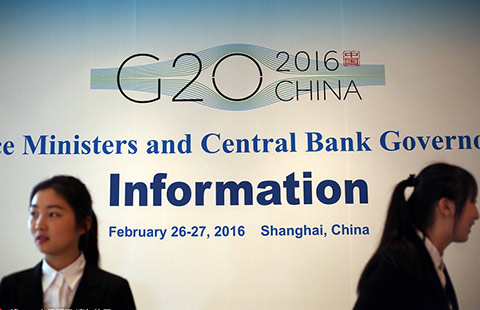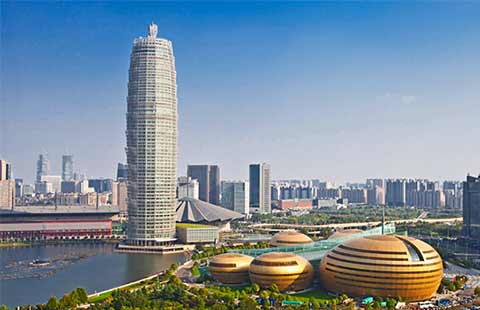China-DPRK trade needs new model
By Jin Meihua (China Daily) Updated: 2012-09-13 07:50
The Democratic People's Republic of Korea has been China's friendly neighbor for decades. It is also a country of strategic importance to China, and the two countries attach great importance to their traditional friendship. Their strengthening economic cooperation will continue to play an important role in the consolidation and development of bilateral relations.
China-DPRK economic cooperation is important for maintaining peace and stability in Northeast Asia especially in the early days of new DPRK leader Kim Jong-un.
The DPRK has made some advances in economic development, but it still faces challenges. It will need time to decide whether it wants to stick to its traditional "military-first" policy or shift the focus on economic development. For instance, it has said that it will not conduct any more nuclear tests, but also declared that, if need be, it will use nuclear weapons to counter the "designs" of the United States.
Pyongyang began focusing on the development of light industries and agriculture in 2010 and made certain achievements in fields such as power generation, agriculture, light industries and technological innovation. But it still faces problems in generating energy, acquiring raw materials, and fighting inflation and international sanctions.
To overcome economic difficulties and maintain stability, the DPRK has been sending out signals of opening up to the outside world. Also, it encourages investment, particularly from China, to strengthen its economic and trade cooperation.
The DPRK accelerated the pace of its foreign economic cooperation in 2010, amending the law for the Rason Economic and Trade Zone and establishing an international investment group, the State Development Bank, and the DPRK Committee of Joint Ventures and Investment.
In June 2011, Beijing and Pyongyang laid the foundation of RETZ and the Hwanggumphyong and Wihwa Islands Economic Zone. In August 2012, the joint steering committee for developing and managing RETZ and HWIEZ was formed. The two sides signed agreements on subjects that included operations of the committee, economic and technological cooperation, agricultural cooperation, construction of the zones and detailed planning.
Economic cooperation between the two countries has strengthened, and the scale of their trade and investment has expanded over the past few decades. The share of China-DPRK trade in Pyongyang's total trade volume has grown continuously, and China's contribution to the DPRK's economic development is growing. For example, China accounted for 20.3 percent of the DPRK's total trade volume in 2000 but the figure increased to 60 percent by 2011. China's investment in the DPRK increased from $50 million in 2004 (accounting for 85 percent of the total foreign investment) to $300 million in 2011, and it is increasing.
But the rapidly developing China-DPRK economic relations have certain problems that need to be solved. Pyongyang has a trade deficit with Beijing and does not have enough foreign exchange reserves. Besides, its economy is anemic and has entered a vicious circle.
The imbalance in China-DPRK trade is not only an impediment to DPRK's development, but also has a negative impact on China's strategic interests. Contrary to the DPRK's trade dependence on China, however, the political influence of Beijing on Pyongyang is limited. For example, China has been in a dilemma over how to deal with the DPRK's nuclear issue and has often been unjustifiably criticized by the international community for not doing enough despite its best efforts.
The first problem is related to the trade structure. The DPRK is becoming increasingly dependent on Chinese exports, but most of the commodities exported by China are low-end, replaceable consumer goods. So China's exports cannot have a decisive impact on the DPRK's industrial layout and development.
Moreover, China's investment in the DPRK is concentrated mainly on mineral and other strategic resources. And though the problem of investment recovery can be solved, investors have to take the risk of coping with the DPRK's policy changes.
Some Chinese enterprises that have invested in the DPRK reportedly suffered losses, for which they blame the investment environment in that country. It's true that enterprises cannot be certain of making profits, no matter which country they invest in, and have to learn to cope with local laws and regulations to guard against inherent risks. But it's also true that the DPRK has to improve its investment environment and make its policies more stable.
The DPRK will face more difficulties if enterprises refuse to enter its market. But there are signs that the DPRK is taking measures to make it easier for investors to thrive in the country. For example, when some reports alleged that a Chinese company that had invested in the DPRK had suffered a huge loss, Pyongyang said the claim was groundless, indicating that the new Kim Jong-un administration had become more concerned about investment.
Besides, China no longer provides free aid to the DPRK, as it did during the Cold War era. Instead, it has found ways to better promote normal development of China-DPRK economic relations.
Given the challenges of the China-DPRK economic relations, the two neighbors also need to explore new modes of cooperation to further promote and consolidate bilateral political and economic relations.
The author is a research scholar in Northeast Asia Studies at the Jilin Academy of Social Sciences.
(China Daily 09/13/2012 page9)
- New policy hardwires scientists for commercial success
- Structural reform answer to falling global growth, productivity
- Walmart to open 30 new stores in China
- China plays stabilizing role in troubled world: Russian expert
- More Chinese car owners turn to independent stores for after-sales service
- IMF chief stresses structural reforms
- China to promote service trade innovation in pilot areas
- China-Germany economic cooperation in good momentum: Chinese Commerce Minister
















